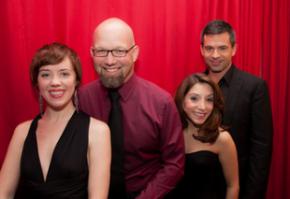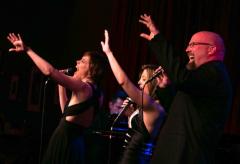
Elizabeth Ahlfors
An Early Night for 11 O’Clock Numbers
Jim Caruso’s Broadway at Birdland with “11 O'Clock
Numbers at 7 O'Clock”
This one-night only performance calls for a little historical explanation.
As Scott Coulter, director and performer in “11 O'Clock Numbers
at 7 O'Clock,” pointed out, back in the days when Broadway musicals
began at 8:30pm, audiences were known to start nodding off in the
later hours. What was needed was a vigorous, show-stopping “11
o'clock number” to shake things up and drive the show to the
finale. These days, however, most agree that the 11 o’clock
number does not have to shatter the roof but it must be memorable
and come late in the show. In any case, many of these songs became
theater classics and they are always fun to hear with a smidgen of
information. One year ago, Siegel shifted the time and brought the show to Jim Caruso’s Broadway at Birdland series as “11 O'Clock Numbers at 7 O'Clock.” The show sold out and returned one year later, again filling Birdland. The show moved at a lively pace with songs for everyone’s strong points. Coulter has a clear tenor voice that soars with long clean lines. He opened the show with a rousing “Tomorrow” (“Annie”). Coulter is not a belter but his two female co-horts, while petite, have mighty voices that could ring out to 44th Street. Christina Bianco (“Newsical”) reprised “Gimme Gimme,” originally belted by Sutton Foster in “Thoroughly Modern Millie,” a song most would agree is a definitive 11 o'clock number. Bianco was also a knockout with “As Long As He Needs Me” from “Oliver.”
Similarly, Carole J. Bufford’s resonant “The Winner Takes All” (“Mamma Mia!”) raised the roof and she proved she can showcased a song’s theatricality with “What Did I Have?” from “On a Clear Day You Can See Forever.” Bufford turned the volume down for “There Are Worse Things I Could Do,” Rizzo’s song in “Grease.” If some argue that the show’s “We Go Together” might be more applicable as an 11 o'clock number, the tough girl Rizzo’s poignant self-explanation adds variety to this production. Always a highlight in Bianco’s appearances is her spot-on impressions. Here, singing “Cabaret,” she delivered hilarious carbon copy snippets of the song as it might be sung in the styles of, Streisand, Garland, Andrews, Chenoweth, Celine Dion, Bernadette Peters and Patti LuPone. Coulter’s winning moment came with a sentimental ballad by Sammy Fain and Irving Kahal, “I’ll Be Seeing You,” ending with a celestial falsetto, letting the tone fade to an emotional end. The song was introduced in a 1938 musical, “Right This Way,” which had a run of 15 performances. “I’ll Be Seeing You,” however, returned to became a Billboard top tune in 1944 and still remains a standard. (Incidentally, “Right This Way” also introduced “I Can Dream, Can’t I?” another evergreen). The three joined together for blends that were tight and harmonic. In the original musical, the frisky “Sing For Your Supper” (“Boys from Syracuse”) was performed by three women but here Coulter’s tenor joined with Bufford and Bianco’s more vibrant tones. They brought their harmonies to “Being Alive” from “Company” and, putting down the microphone, they brought the show to a close with “What I Did For Love,” the only ballad in “A Chorus Line.” Accompanist John Fischer deserves a second bow for his creative and supportive piano accompaniments. With a regular run, “11 O'Clock Numbers at 7 O'Clock” could be the start of something big all over again. |
| museums | NYTW mail | recordings | coupons | publications | classified |


